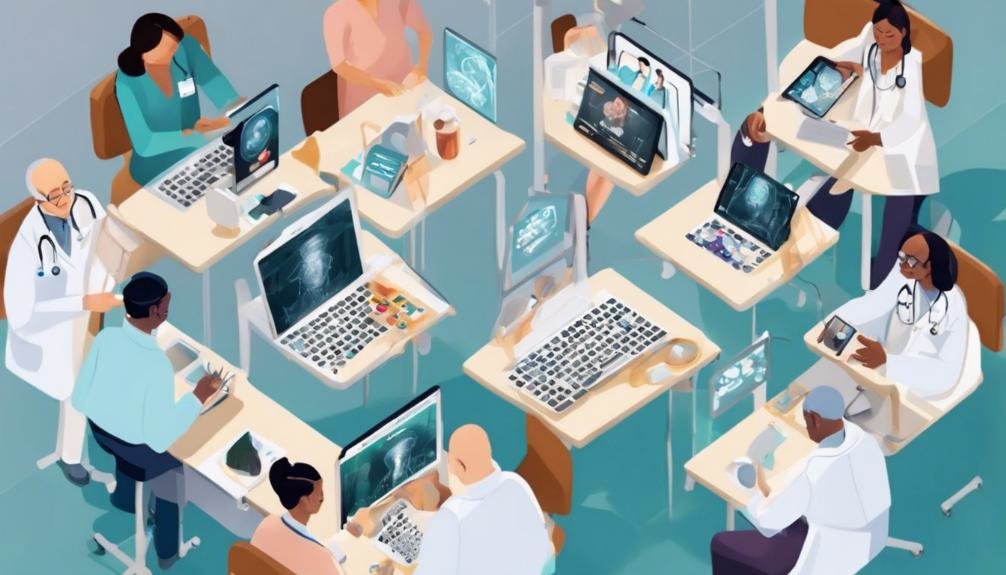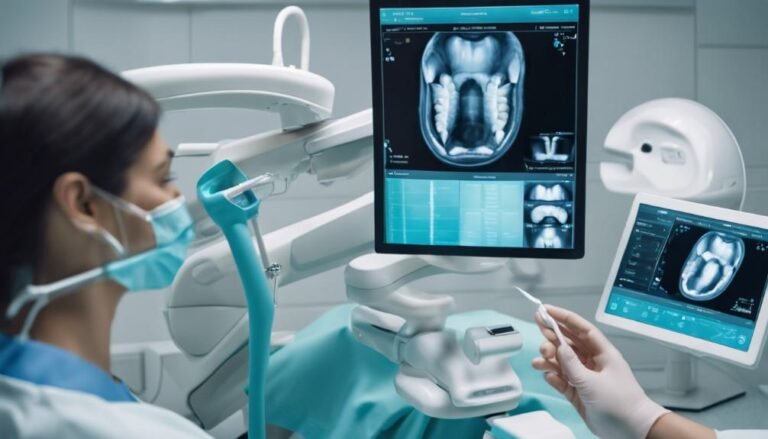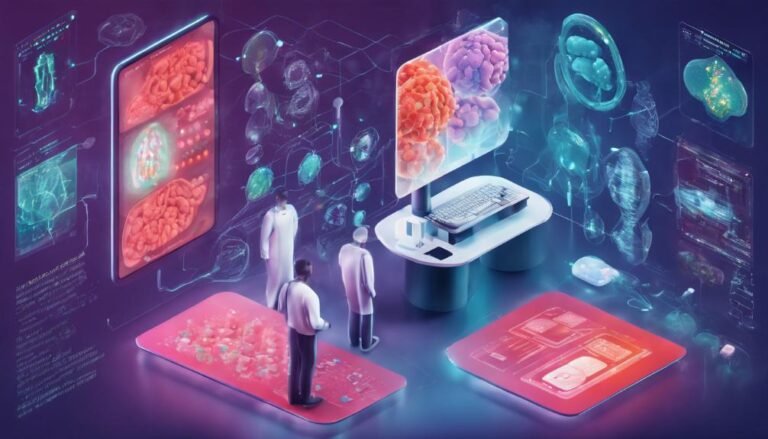AI for Personalized Patient Education
When AI steps into the domain of personalized patient education, a new era of healthcare dawns. Imagine a virtual assistant that tailors educational materials specifically to your needs, guiding you through complex medical information with ease. This innovative approach not only enhances your understanding of health-related topics but also empowers you to make informed decisions about your well-being. The impact of AI in patient education is profound, reshaping the dynamics of healthcare interactions in ways that hold immense promise for the future of personalized care.
Key Takeaways
- AI tailors health information to individual needs.
- Enhances patient engagement and understanding.
- Utilizes data analysis for personalized content.
- Offers interactive modules for better comprehension.
- Improves treatment adherence rates with personalized reminders.
Benefits of AI in Patient Education
AI in patient education offers personalized learning experiences, tailored to individual needs and preferences, enhancing understanding and engagement. Through advanced data analysis, AI can assess a patient's learning style, health literacy level, and medical history to deliver targeted educational content. This personalized approach not only improves comprehension but also increases patient engagement, leading to better retention of information.
By leveraging AI for patient education, healthcare providers can track patient outcomes more effectively. AI algorithms can analyze patient data to identify trends, gaps in understanding, or areas needing further clarification. This data-driven approach enables healthcare professionals to adjust educational strategies in real-time, ensuring that patients receive the information they need to make informed decisions about their health.
In essence, AI in patient education revolutionizes the way information is delivered, making it more accessible and relevant to each individual. By harnessing the power of data analysis, AI enhances patient outcomes by tailoring educational content to address specific needs and preferences.
Tailoring Information to Patient Needs
You can enhance patient engagement by customizing health information to suit individual needs.
This tailored approach guarantees that patients receive personalized education that resonates with their unique circumstances.
Customizing Content for Patients
Tailoring information to meet individual patient needs is a fundamental aspect of providing personalized healthcare education. By customizing content for patients, you can enhance their learning experience and empower them to take an active role in managing their health. Personalized approaches guarantee that patients receive accurate information that's relevant to their specific circumstances, increasing their understanding and engagement.
Personalized approaches guarantee that patients receive accurate information that's relevant to their specific circumstances, increasing their understanding and engagement.
When content is tailored to patients, it speaks directly to their concerns and preferences, making the information more relatable and impactful. This approach fosters a sense of empowerment, enabling patients to make informed decisions about their health and treatment plans. Patients are more likely to retain and apply knowledge when it's presented in a way that resonates with their unique backgrounds and needs.
Customized content not only improves patient education but also strengthens the patient-provider relationship. When patients feel that information is personalized to them, trust and communication are enhanced, leading to better health outcomes.
Embracing tailored content is a valuable tool in promoting patient engagement and overall wellness.
Individualized Health Education
To provide effective personalized patient education, it's essential to tailor health information to meet the specific needs and preferences of each individual. Personalized coaching plays a pivotal role in guiding patients towards better health outcomes by addressing their unique circumstances. Health assessments help in understanding individual health risks and needs, enabling the creation of targeted interventions that focus on areas requiring attention.
Customized resources, such as educational materials and interactive tools, can be tailored to suit the patient's learning style and health literacy level. These resources are designed to empower patients with the knowledge and skills necessary to make informed decisions about their health. By delivering information in a way that resonates with each individual, personalized patient education becomes more engaging and impactful.
Through individualized health education, healthcare providers can foster a supportive environment that encourages patients to actively participate in their care. By leveraging personalized coaching, health assessments, targeted interventions, and customized resources, patients can receive the guidance they need to navigate their health journey with confidence and understanding.
Enhancing Patient Understanding With AI
Utilizing artificial intelligence (AI) can greatly enhance patient understanding by personalizing educational materials to meet individual needs and preferences. AI-driven communication allows for the delivery of tailored information based on a patient's specific health condition, making the learning experience more engaging and relevant. By offering personalized recommendations, AI guarantees that patients receive the right information at the right time, leading to improved comprehension and retention.
Patient-centered learning is further facilitated through interactive modules powered by AI. These modules enable patients to actively engage with the educational material, enhancing their understanding through quizzes, simulations, and real-life scenarios. Such interactive features not only make learning more enjoyable but also help patients apply the knowledge to their own health situations effectively.
Improving Treatment Adherence Rates
Enhance your adherence to treatment plans by incorporating personalized reminders and educational content delivered through AI-driven platforms. Behavioral interventions and technology solutions play an essential role in addressing adherence challenges. By utilizing personalized approaches tailored to your specific needs, these interventions can greatly improve your treatment adherence rates.
AI-powered platforms can provide you with reminders for medication schedules, follow-up appointments, and lifestyle modifications. These reminders are personalized to your preferences and health goals, helping you stay on track with your treatment plan.
Additionally, educational content delivered through these platforms can enhance your understanding of the importance of adhering to prescribed treatments.
Through a combination of behavioral interventions and innovative technology solutions, you can overcome common challenges related to treatment adherence. By receiving personalized reminders and educational content, you can take proactive steps towards better managing your health and achieving positive outcomes.
Enhancing Patient Engagement Through Personalization
By tailoring educational content to suit individual needs, patients can benefit from a more personalized learning experience. This approach allows for a deeper understanding of their condition and treatment, fostering increased engagement and empowerment in their healthcare journey.
Providing personalized education can enhance patient involvement and promote better health outcomes.
Tailored Education Content
Tailoring education content to meet individual patient needs is essential for fostering meaningful engagement and promoting better health outcomes. Patient empowerment thrives on a personalized approach that resonates with each individual's unique circumstances. By tailoring communication to suit specific patient needs, healthcare providers can cultivate a deeper connection that enhances the patient's understanding and involvement in their care.
Personalized patient education content goes beyond generic information, delving into the specifics that matter most to the individual. Understanding a patient's preferences, health literacy level, cultural background, and personal health goals enables healthcare professionals to craft educational materials that aren't only informative but also relatable and actionable.
When patients receive education that speaks directly to their concerns and aligns with their values, they're more likely to engage proactively in managing their health. This tailored approach fosters a sense of partnership between patients and healthcare providers, paving the way for improved health outcomes and a more satisfying healthcare experience.
Individualized Learning Experiences
Crafting personalized learning experiences tailored to individual patient needs is a key strategy in fostering active engagement and empowerment in their healthcare journey. By incorporating adaptive learning techniques, healthcare providers can offer tailored educational content that adjusts to the patient's learning pace and preferences. This approach guarantees that patients receive information in a format that resonates best with them, increasing comprehension and retention.
Moreover, personalized coaching plays a crucial role in enhancing patient engagement. Through one-on-one sessions or digital platforms, patients can receive personalized guidance, support, and encouragement tailored to their specific health goals and challenges. This individualized approach promotes a sense of accountability and motivation, empowering patients to take an active role in managing their health.
Leveraging AI for Health Literacy
Utilizing artificial intelligence (AI) presents a promising opportunity to enhance health literacy through personalized patient education. AI algorithms can analyze vast amounts of healthcare data to tailor educational content to individual needs, making complex medical information more accessible and understandable.
Health literacy initiatives can leverage AI to identify gaps in knowledge and deliver targeted resources that cater to specific learning styles and preferences.
By utilizing AI algorithms, health literacy initiatives can track patient interactions and adapt educational materials in real-time to guarantee comprehension and engagement. This personalized approach can improve patient understanding of medical conditions, treatment options, and preventive care measures.
Additionally, AI-powered tools can provide interactive resources such as chatbots or virtual simulations to enhance learning experiences and reinforce key health concepts.
Customizing Educational Content With AI
To enhance the effectiveness of health literacy initiatives, AI can be harnessed to customize educational content based on individual needs and preferences, paving the way for more personalized patient education experiences.
Content personalization through AI algorithms guarantees that the information provided is relevant and tailored to each patient's unique requirements. By analyzing data such as medical history, demographics, and even preferred learning styles, AI can generate educational materials that resonate with individuals on a personal level.
This educational customization not only increases engagement but also empowers patients to take an active role in their healthcare journey. By receiving information in a format that suits them best, patients are more likely to understand and retain important medical knowledge, leading to improved health outcomes.
AI-driven content personalization goes beyond a one-size-fits-all approach, allowing for a more inclusive and effective educational experience for patients from diverse backgrounds and with varying levels of health literacy.
Real-life Applications of AI in Patient Education
Harnessing the power of artificial intelligence, healthcare providers are revolutionizing patient education by implementing AI-driven solutions in real-life scenarios. AI-powered learning tools are being used to create personalized health resources that cater to the specific needs of individual patients. For instance, AI algorithms can analyze a patient's medical history, current health status, and treatment plan to generate educational materials tailored to their unique circumstances.
In real-life applications, hospitals and clinics are utilizing AI to deliver customized educational content to patients through interactive platforms. These platforms can provide information on medications, treatment procedures, and lifestyle recommendations based on the patient's preferences and comprehension level. By offering personalized health resources, AI helps patients better understand their conditions, empowering them to make informed decisions about their health.
Furthermore, AI-powered chatbots are being integrated into patient education strategies to provide instant support and answer queries in real-time. This technology enhances patient engagement and ensures that individuals have access to accurate information whenever they need it.
Conclusion
To sum up, AI for personalized patient education is a game-changer in healthcare. By tailoring information to individual needs, enhancing understanding, and improving engagement, AI empowers patients to take control of their health journey.
Through advanced data analysis and customized content, AI not only boosts treatment adherence rates but also fosters a stronger patient-provider relationship.
Embrace the power of AI in patient education to revolutionize healthcare and drive better outcomes for all.







